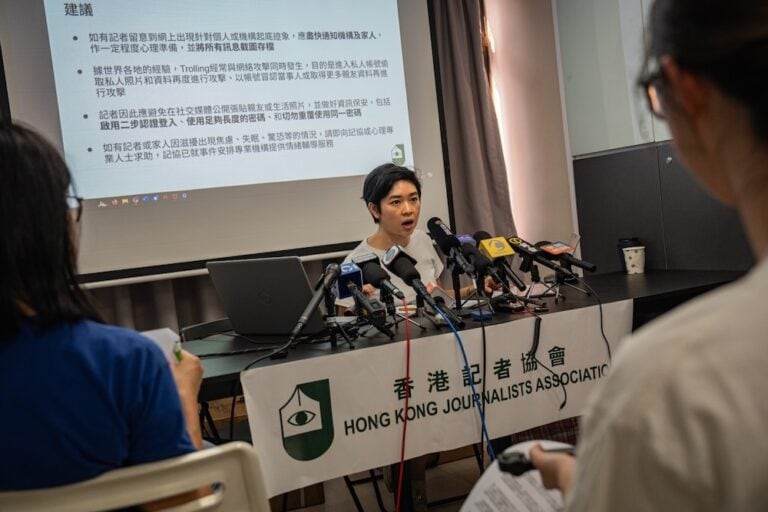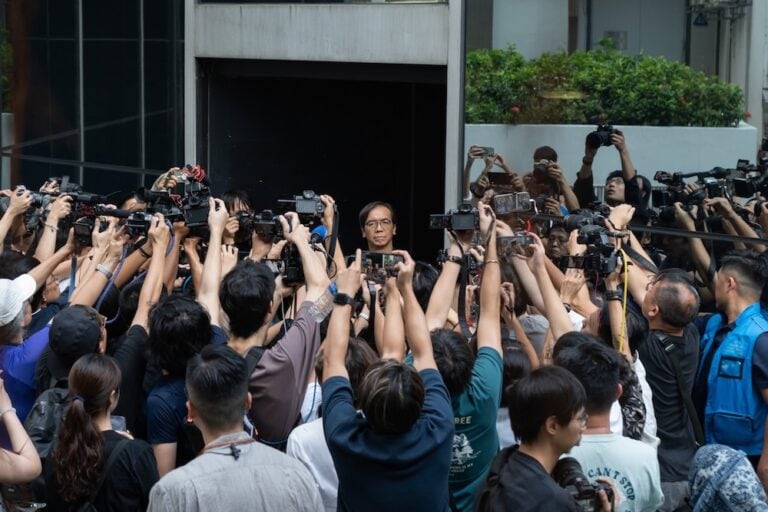(CPJ/IFEX) – The following is a 31 March 2006 CPJ press release: Hong Kong complaint targets Yahoo for role in jailed journalist case New York, March 31, 2006 – A Hong Kong legislator and a representative for the family of jailed Chinese journalist Shi Tao filed a privacy complaint Thursday against U.S. Internet giant Yahoo […]
(CPJ/IFEX) – The following is a 31 March 2006 CPJ press release:
Hong Kong complaint targets Yahoo for role in jailed journalist case
New York, March 31, 2006 – A Hong Kong legislator and a representative for the family of jailed Chinese journalist Shi Tao filed a privacy complaint Thursday against U.S. Internet giant Yahoo for its role in the imprisonment, according to news reports. The family is also considering legal action against the company in Hong Kong or the United States, said Zhang Yu, a spokesman for the family.
Zhang and Hong Kong legislator Albert Ho said that Yahoo’s Hong Kong operations violated a Hong Kong personal data privacy ordinance when the company provided mainland authorities with account information used as evidence to sentence Shi to a 10-year prison term for “providing state secrets to foreigners.” Their complaint was filed with Hong Kong’s Office of the Privacy Commissioner for Personal Data, which said that it would investigate, according to international news reports. Yahoo has denied violating any privacy rules.
“We support a prompt and thorough investigation into Yahoo’s compliance with Hong Kong privacy regulations,” CPJ Executive Director Ann Cooper said. “Our colleague Shi Tao continues to be jailed unjustly by the Chinese government for sending an e-mail on a Yahoo account that he believed was private.”
At a press conference today, Ho showed court documents revealing that Yahoo Holdings (Hong Kong) Ltd provided information to authorities that helped identify Shi, an editor of Contemporary Business News in China’s Hunan province, as sending an e-mail to a U.S.-based Web site summarizing propaganda authorities’ instructions to the newspaper.
“They’re a Hong Kong company,” Ho told reporters, according to The Associated Press. “Why do they have to comply with Chinese requests? This is the biggest question.”
The April 2005 criminal verdict issued by Changsha Intermediate People’s Court in Hunan refers to “account holder information furnished by Yahoo Holdings (Hong Kong) Ltd.” The verdict said the information confirmed the sender’s telephone number and business address.
Yahoo’s General Counsel Michael Callahan wrote in a December 2005 letter to CPJ that Yahoo had responded to an information demand by the mainland PRC government, but that Yahoo’s Hong Kong subsidiary was not involved.
“The PRC government ordered Yahoo! China to provide information and Yahoo! China complied with applicable PRC law. Neither Yahoo! Hong Kong nor any other Yahoo! subsidiary would respond to a PRC law enforcement request, other than in accordance with their own applicable laws,” Callahan wrote. “In this case, our domain names in China were registered to Yahoo! Holdings (Hong Kong) Limited, which was also the holding company for the Yahoo! China operations, however, as indicated above, Yahoo! Hong Kong was not involved in any way in this matter.”
In November 2005, CPJ honored Shi with an International Press Freedom Award for his courage in defending the ideals of free expression.
CPJ is a New York-based, independent, nonprofit organization that works to safeguard press freedom worldwide. For more information, visit http://www.cpj.org.


